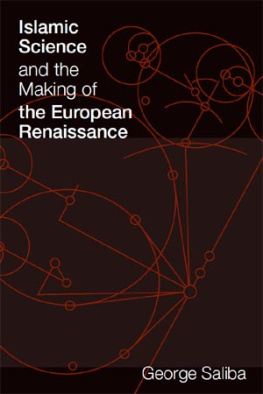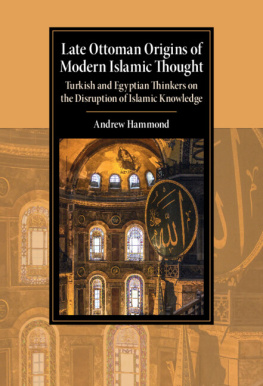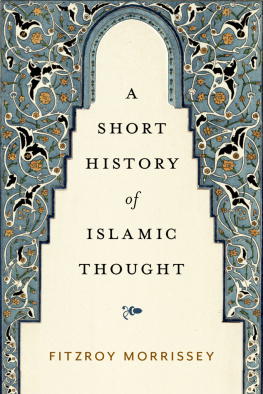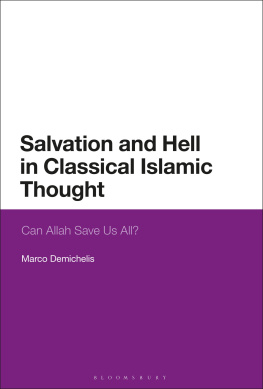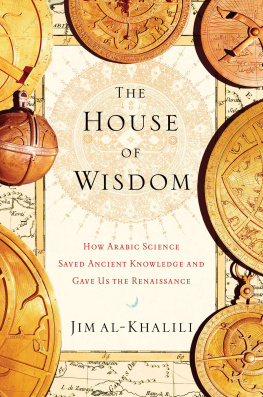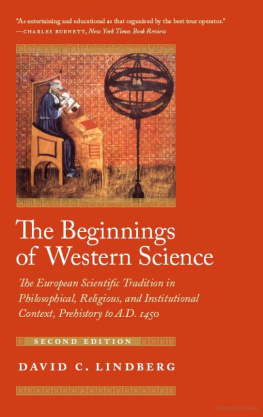Islamic Science and the Making of the European Renaissance
Transformations: Studies in the History of Science and Technology
Jed Z. Buchwald, general editor
Jesuit Science and the Republic of Letters
Mordechai Feingold, editor
Ships and Science: The Birth of Naval Architecture in the Scientific Revolution, 16001800
Larrie D. Ferreiro
Wireless: From Marconis Black-Box to the Audion
Sungook Hong
The Path Not Taken: French Industrialization in the Age of Revolution, 17501830
Jeff Horn
Harmonious Triads: Physicists, Musicians, and Instrument Makers in Nineteenth-Century Germany
Myles W. Jackson
Spectrum of Belief: Joseph von Fraunhofer and the Craft of Precision Optics
Myles W. Jackson
Affinity, That Elusive Dream: A Genealogy of the Chemical Revolution
Mi Gyung Kim
Shifting Ontologies: Materials in Eighteenth-Century Science
Ursula Klein and Wolfgang Lefvre
American Hegemony and the Postwar Reconstruction of Science in Europe
John Krige
Conserving the Enlightenment: French Military Engineering from Vauban to the Revolution
Janis Langins
Picturing Machines 14001700
Wolfgang Lefvre, editor
Heredity Produced: At the Crossroads of Biology, Politics, and Culture, 15001870
Staffan Mller-Wille and Hans-Jrg Rheinberger, editors
Secrets of Nature: Astrology and Alchemy in Early Modern Europe
William R. Newman and Anthony Grafton, editors
Historia: Empiricism and Erudition in Early Modern Europe
Gianna Pomata and Nancy Siraisi, editors
Nationalizing Science: Adolphe Wurtz and the Battle for French Chemistry
Alan J. Rocke
Islamic Science and the Making of the European Renaissance
George Saliba
Islamic Science and the Making of the European Renaissance
George Saliba
The MIT Press
Cambridge, Massachusetts
London, England
2007 Massachusetts Institute of Technology
All rights reserved. No part of this book may be reproduced in any form by any electronic or mechanical means (including photocopying, recording, or information storage and retrieval) without permission in writing from the publisher.
For information on quantity discounts, please email
Set in Stone Serif and Stone Sans by Graphic Composition, Inc. Printed and bound in the United States of America.
Library of Congress Cataloging-in-Publication Data
Saliba, George.
Islamic science and the making of the European Renaissance / George Saliba.
p. cm.
Includes bibliographical references and index.
ISBN-13: 978-0-262-19557-7 (hardcover : alk. paper)
1. ScienceIslamic countriesHistory. 2. Islam and science. 3. Science, Medieval.
4. CivilizationWesternIslamic influences. I. Title.
Q127.I742.S35 2007 509.1767dc22
2006023618
10 9 8 7 6 5 4 3 2 1
Contents
Preface
1 The Islamic Scientific Tradition: Question of Beginnings I
2 The Islamic Scientific Tradition: Question of Beginnings II
3 Encounter with the Greek Scientific Tradition
4 Islamic Astronomy Defines Itself: The Critical Innovations
5 Science between Philosophy and Religion: The Case of Astronomy
6 Islamic Science and Renaissance Europe: The Copernican Connection
7 Age of Decline: The Fecundity of Astronomical Thought
Notes and References
Bibliography
Index
Preface
This is essentially an essay in historiography. It critiques the current trends of the historiography of Islamic and Arabic science and attempts to make use of the latest historical findings in order to propose a new historiography that could better explain the scientific developments and, in a more general sense, the major trends in the intellectual history of Islamic civilization. It touches on periodization, on the relation of science to the general intellectual environment, on the social and political dimensions of scientific production, and on the relationship between the technical scientific details, in a particular discipline and the social support and recognition of those disciplines.
The main ideas discussed herein have already been articulated, in a preliminary manner, in my book al-Fikr al-Ilm al-Arab (Balamand University Press, Lebanon, 1998). Now they are availablemore extensively developed in some major respectsto those who do not read Arabic. The main features of the thesis expressed earlier in al-Fikr are supported here by fuller evidence. Furthermore, the new literature that has appeared since the publication of al-Fikr, especially that which bears on that books main thesis, is critiqued in this volume. This can, then, be seen as a critique of the contents of that literature, and of the conclusions reached therein. The scrutiny to which those conclusions are now subjected is necessitated by new evidence that has raised doubts about their validity.
The terms Islamic science and Arabic astronomy, used extensively in this book, call for an explanatory comment. Islamic science, is intended to designate those sciences that were developed in the Islamic civilization and which did not fall within the sphere of disciplines usually designated with the Arabic expression al-ulm al-islmya (Islamic sciences). The latter group usually dealt with religious Islamic thought proper and thus is not of central concern in this volume. In contrast, the Islamic sciences studied here were considered as part of the foreign or rational sciences (ulm alawil or al-ulm al-aqlya), or even the philosophical sciences (al-ulm al-falsafya or al-ikmya), in classical Islamic times, and did not in any way designate the religious, juridical, exegetical, linguistic, or Quranic sciences that were usually separately classified as al-Ulm al-naqlya (the transmitted sciences). Islamic is therefore used in this more complex civilizational sense and not in the religious sense.
The term Arabic finds its justification in two major ways: First, Arabic was for a long time the scientific language of the Islamic civilization, from the eighth and ninth centuries to our own times, in much the same way as it was the language of the religious sciences as well, irrespective of the geographic area where those sciences were written or studied. These conditions, which prevailed throughout most of Islamic history, opened various avenues for people of various races and religious backgrounds to participate in the production of this civilization. Those same people may have spoken Persian, Syriac, or even later Turkish and Urdu at home. And yet they mostly expressed their intellectual production, and especially the scientific part of it, in Arabic, much as Ibn Maymn (Maimonides) wrote most of his philosophical and medical works in Arabic while reserving Hebrew for his religious and juridical production. Second, the history of the discipline of astronomy is used in this book as a template to illustrate the periodization and the ups and downs of Islamic scientific thought in general. And the kind of astronomy that was most prevalent in the Islamic civilization, and that was also most vibrant, was the new astronomy that was called ilm al-haya (science of the configuration [of the world] = Astronomy), a coined Arabic phrase that had no Greek equivalent. It was this astronomy that continued to be written almost exclusively in Arabic from the ninth century on. This is also the astronomy that forms the main focus of this book. Furthermore, there were no times, throughout Islamic intellectual history, when the term Arabic Astronomy could have been possibly taken to mean that this astronomy was in any way restricted to the geographical domain of the Arabic-speaking regions, or that Arabic was the exclusive language of that discipline. The manner in which this term is used here simply means that Arabic was clearly the language in which most of the works in this discipline were written, as is evidenced by the vast majority of the surviving texts.
Next page
